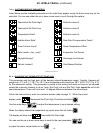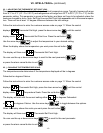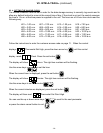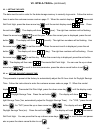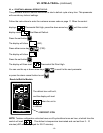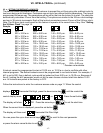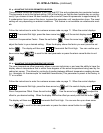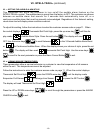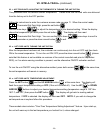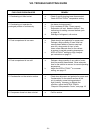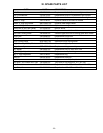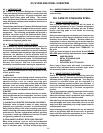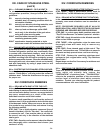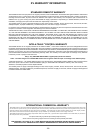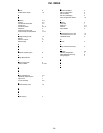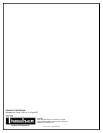
XIII. c - CLEANING SUMMARY - DO’S & DONT’S:
To summarize the proper cleaning of Traulsen
refrigeration products, always follow the below
guidelines.
DO use only cleaning products designed for
stainless steel, or cleaning products which do
not contain chlorides.
DO use only non-abrasive cleaning materials, such
as soft cloths or plastic scouring pads.
DO clean-up food and beverage spills ASAP.
DO scrub only in the direction of the grain when
using soft nylon scouring pads.
DON’T use chlorinated cleansers or cleansers
containing quaternary salts.
DON’T use abrasive cleaning materials or tools
which can scratch the stainless steel’s surface.
XIII. d -
DEALING WITH ACCIDENTAL CHLORIDE CONTACT
:
In the daily routine of a busy foodservice operation, your
Traulsen refrigeration product may occasionally come
in contact with chlorinated cleaners, such as when
being splashed during mopping. Stain and corrosion
problems resulting from this can be avoided by prompt
action to remove this cleanser. Rinse the affected area(s)
thoroughly with cool, clean water (do not use hot water)
and wipe completely dry using a paper towel or soft
absorbent cloth.
XIII. e - PROTECTING THE STAINLESS STEEL SURFACE:
Occasional use of a commercial stainless steel polish,
such as “Sheila Shine,” will help protect the surface of
stainless steel. Follow the directions on the spray can
for proper use.
XIV. CORROSION REMEDIES
XIV. a - DEALING WITH RUST AFTER THE FACT:
Although Traulsen strongly recommends proper care
and cleaning of stainless steel finishes in order to avoid
rust and corrosion before it occurs, we recognize that it
may occur occasionally as a result of the causes
described in section one of this booklet.
To remove small quantities of rust from the surface of
stainless steel, it is far preferable to deal with this when
it first becomes visible. When rust occurs, do not allow
it to remain for any period of time, and remove it using
the following method:
STEP ONE - Use a lightly abrasive compound (free of
harmful chlorides), such as “Bon Ami,” on a soft cloth,
to remove the rust. Care must be taken to rub this on
the area of rust only in the direction of the stainless
steel’s grain.
STEP TWO - Once the rust is removed, clean the affected
area thoroughly with a stainless steel cleaner (see
sections II. a & b).
-24-
XIII. CARE OF STAINLESS STEEL
(cont’d)
XIV. CORROSION REMEDIES
XIV. a - DEALING WITH RUST AFTER THE FACT (cont’d):
STEP THREE - Apply a preservative polish, such as
“Sheila Shine,” to the affected area (see section II. e).
XIV. b - DEALING WITH EXTREME RUST SITUATIONS:
In the event that rust and corrosion were not dealt with
promptly, more acute situations can be remedied as
follows:
NOTE: PROCEDURE REQUIRES USE OF AN ACID
BASED SOLUTION - USE OF PROTECTIVE GLOVES AND
EYEWEAR ARE REQUIRED BEFORE PROCEEDING
STEP ONE - In a clean spray bottle combine water with
“Zep FS Lime Remover” to make a 5 parts to 1 solution.
STEP TWO - Apply this solution to the affected area with
either a clean cloth or sponge.
STEP THREE - After application, wipe the same area
thoroughly clean with water only to remove any
residue.
STEP FOUR - Once cleaned, apply a light coat of “Zep
Restore” to the surface area. This will serve to preserve
the metal and help prevent future rust from occuring.
STEP FIVE - Restore the remaining stainless steel
surfaces to their original shine using “Zep Stainless
Steel Polish.”
Repeat steps one thru five if necessary for stubborn rust
and corrosion areas.
XIV. c -
RESTORING THE PROTECTIVE LAYER:
There are several products available on the market
today which can actually help restore the
“PASSIVATION” of stainless steel. “PASSIVATION”
refers to the protective qualities of the non-reactive
surface layer of stainless steel which prevents
oxidation. Contact your cleaning supplier for product
recommendations and more information.



